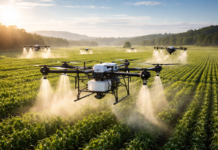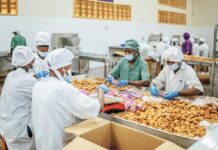
In a significant step towards alleviating food insecurity in South Africa, the Food Innovation Laboratory at the University of the Free State (UFS) has introduced a new line of affordable, protein-rich soy-based dairy alternatives.
This initiative is part of a community project spearheaded by Prof Wilna Oldewage-Theron, a Nutrition Professor at Texas Tech University (USA) and a Research Fellow at the UFS Department of Sustainable Food Systems and Development. In collaboration with the Food Innovation Laboratory at UFS, the project aims to produce a range of economically feasible, high-protein snacks and dairy alternatives using soybeans.
The vision for the Food Innovation Lab was conceived by Prof Johan van Niekerk, Vice-Dean of Agriculture at UFS, and Dr Brandon van Rooyen from the Department of Sustainable Food Systems and Development. Dr Van Rooyen, leveraging his expertise in product development and commercialisation, leads the project’s efforts to create these innovative products.
Since the lab’s inception in early 2023, it has developed a variety of high-protein plant-based products, including soya sausages and mince. They have also introduced healthy snack options such as roasted soya nuts, which serve as high-protein alternatives to peanuts.
“This year (2024), we took the project one step further. During one of our community engagement projects at the ‘Best is Good Enough Academy’ school in the Vaal, we noticed a need for the development of soymilk-derived products. The communities were actively seeking new and exciting products made from the inexpensive soymilk they could easily produce,” says Dr Van Rooyen.
“We have successfully developed low-cost, commercially viable, high-protein flavoured soymilk drinks in a variety of exciting flavours: strawberry, banana, and vanilla. Additionally, we developed a range of yoghurt from soymilk, featuring flavours such as berry and banana, which contain real fruit,” Dr Van Rooyen adds.
During the extraction of soymilk from soybeans, a fibrous byproduct called ‘okara’ is produced. Okara is rich in protein and other nutrients but is typically discarded. “We utilised this byproduct to form dough for making ‘vetkoek’ and a variety of savoury biscuits,” explains Dr Van Rooyen.
Dr Van Rooyen works alongside three other team members to develop these products: Dr Dolapo Adelabu, Research Fellow; Khezwo Nematshema, MSc Student and Researcher; and Vuyelwa Nkoi, PhD Student and Researcher.
Health benefits of soybeans
Dr Van Rooyen highlights the nutritional advantages of soybeans used to produce soymilk, noting that they are naturally cholesterol-free and high in protein. “Soy protein is particularly beneficial as it contains all essential amino acids necessary for human growth and development, which are often not available from other plant sources in the same quantities,” he says.
He further explains that essential amino acids are the building blocks for muscles and body development. “In low-income communities, there is often a clear lack of protein due to limited access and high costs. These products will be crucial in addressing the nutritional needs of the communities. Additionally, over-nutrition – characterised by the consumption of high-energy, low-nutrient foods – is prevalent, leading to health issues such as high blood pressure and insulin resistance, even in young children. These products will directly combat this national crisis in South Africa.”
Cost-effectiveness
According to Dr Van Rooyen, few products offer similar nutritional and protein benefits at such a low cost. “One kilogram of dried soybeans can conservatively produce 2-3 litres of soy milk. The cost of 1 kilogram of soybeans (depending on the market price) is typically less than R10, making it a clear financial advantage over animal meats, dairy and eggs.”
Empowering communities
Funded by UFS and the Oil & Protein Seeds Development Trust (OPDT), the project also aims to promote small, medium, and micro-sized enterprises in low-income communities. By training and educating communities on the benefits of soy as a food source and how to process it into income-generating products, the project not only uplifts communities financially, and also provides access to affordable and nutritious food choices.







